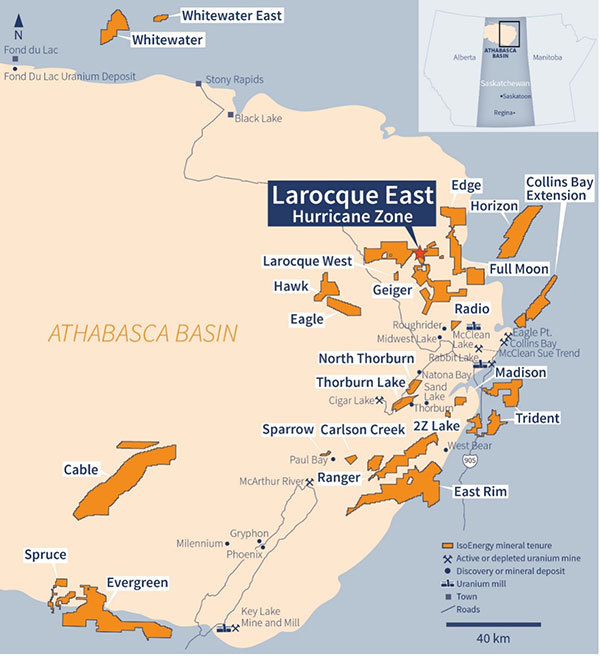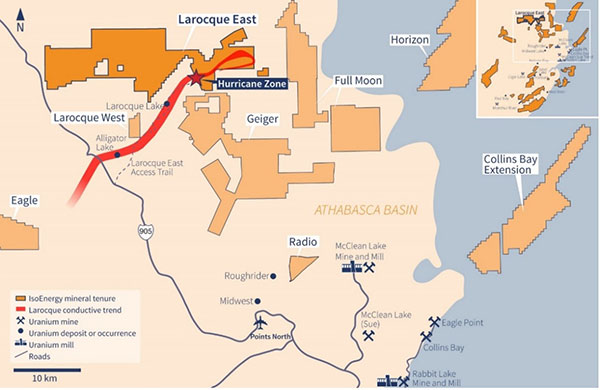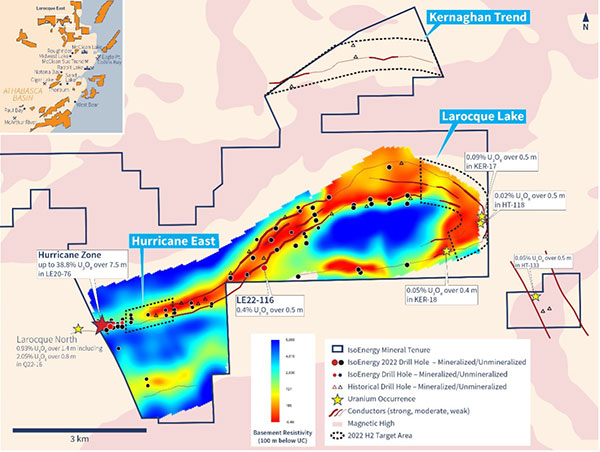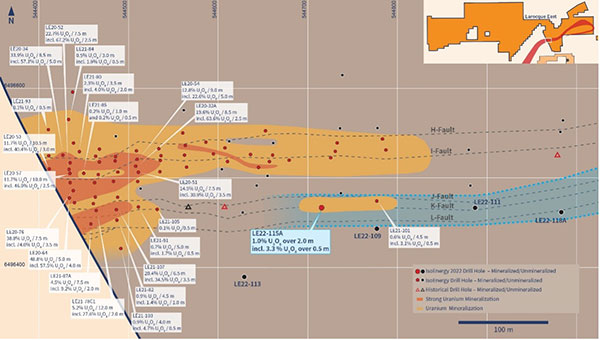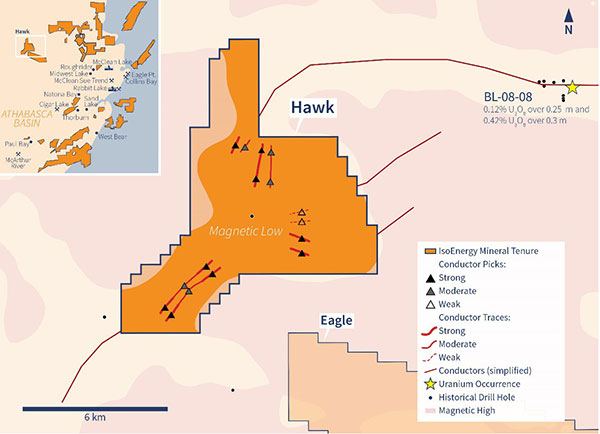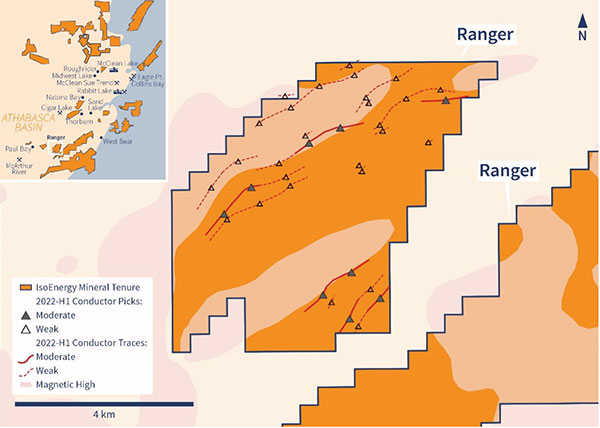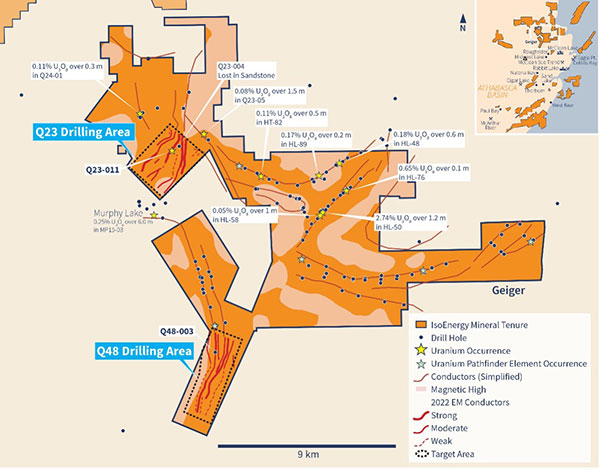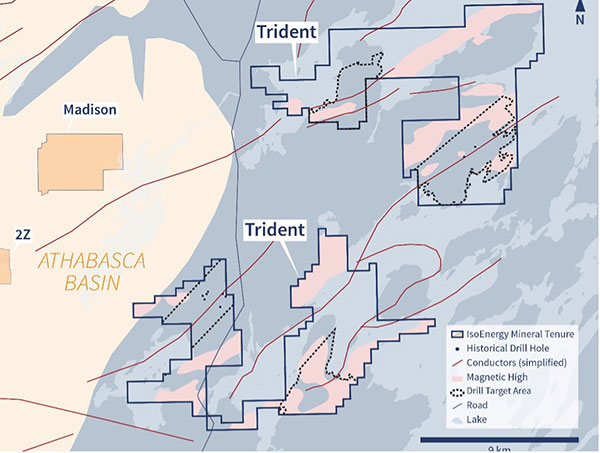Overview
Location
Eastern Athabasca Basin, Saskatchewan, Canada
Ownership
100% IsoEnergy
Deposit Type
Unconformity related sandstone and basement hosted uranium
Stage
Exploration
Primary Minerals
Uranium
IsoEnergy Provides Update on Winter Results and Announces Summer Exploration Plans
July 15, 2022Saskatoon, SK, July 15, 2022 – IsoEnergy Ltd. (“IsoEnergy” or the “Company”) (TSXV: ISO; OTCQX: ISENF) is pleased to provide an update on its winter exploration results and to announce its summer 2022 exploration plans for its eastern Athabasca Basin uranium properties (Figure 1).
Winter Assay Results and Geophysical Surveys Update
Larocque East Project
Chemical assays are summarized in Table 1 for the final two drill holes which intersected radioactivity >500 CPS during the winter of 2022. At the Hurricane zone, LE22-115A targeted the unconformity 75m west of LE21-101 and intersected 2.0m averaging 1.0% U3O8 between 335.0m and 337.0m which includes a 0.5m subinterval averaging 3.3% U3O8 from 335.5 to 336.0m. Approximately 3.8km to the east-northeast, LE22-116 intersected 0.5m averaging 0.4% U3O8 from 282.0m to 282.5m. Neither result is considered to warrant direct follow-up at this time. Figures 3 and 4 show the locations of LE22-116 and LE22-115A, respectively.
Table 1 – Larocque East Winter 2022 Assay Results
Notes:
- Radioactivity is total gamma from drill core measured with an RS-125 hand-held spectrometer
- Radioactivity previously disclosed
Hawk Project
Electromagnetic surveying completed at Hawk during the winter of 2022 advanced the project to a drill-ready state. With multiple conductive responses mapped on each of six survey lines, the winter work generated a drill target inventory that exceeded IsoEnergy’s expectations. The Hawk project contains over 10km of prospective magnetic low zones hosting conductors with depths to the unconformity expected to be between 600m and 750m. The single historical drill hole completed within the project failed to intersect conductive basement, indicating that none of the prospective stratigraphy has been effectively tested. A first pass drilling campaign to follow up the 2022 results is planned for 2023. Figure 5 shows the Hawk survey area and interpreted results.
Ranger Project
As at Hawk, electromagnetic surveying completed at Ranger during winter 2022 advanced the project to a drill-ready state. The winter survey work mapped weakly to moderately conductive trends in two areas. The northwestern conductive trends are associated with magnetic breaks and are completely untested by drilling within the project. The southern conductive trends are associated with a magnetic break and the projection of the Bird Lake Fault, a significant post-Athabasca structure which has a vertical offset of up to 80m. The depth to the unconformity in the survey area is expected to between 230 and 300m. A first pass drilling campaign to follow up the 2022 results in planned for 2023. Figure 6 shows the Ranger winter 2022 survey results.
Summer Exploration Plans
Highlights:
- Diamond drilling at Larocque East, Geiger, and Trident totalling 7000m
- Airborne geophysical surveying at Evergreen, Spruce, East Rim, Edge, and Full Moon
Tim Gabruch, President and Chief Executive Officer commented: “As we move towards an initial Mineral Resource Estimate for Hurricane and plan the next stage of advancement on that project, we will continue to advance exploration on the eastern side of our Larocque East property and in parallel focus on additional properties in our high-quality exploration portfolio.”
Andy Carmichael, Vice President of Exploration commented: “The second half of 2022 will see IsoEnergy explore eight projects spread throughout the eastern Athabasca region. We are excited to resume drilling at Larocque East and Geiger, and initial reconnaissance drilling at Trident will provide valuable geological information on this underexplored project which is immediately adjacent to the Athabasca Basin. Additionally, an extensive program of airborne surveying will move several of our early-stage projects toward drill-readiness.”
Diamond Drilling:
Larocque East Project
Drilling at Larocque East will comprise six drill holes totalling 2000m. The main objectives of the drilling are to continue exploring the Larocque Lake conductive trend and to assess the prospectivity of the Kernaghan trend. Drilling on the Larocque Lake trend will follow-up strongly anomalous geochemistry within two kilometres along strike of the Hurricane zone and test high-priority geophysical targets in the eastern portion of the project. On the Kernaghan trend, where historical drilling identified over 40m of unconformity topography associated with anomalous geochemistry in the Athabasca sandstones, drilling will test for significant basement structures which would warrant follow-up. Figure 3 shows the general target areas for Larocque East drilling.
Geiger Project
Eight holes totalling 3000m are planned at Geiger. Drilling will follow-up winter 2022 geophysical results in the Q23 and Q48 areas where electromagnetic (EM) surveying mapped more than 35km of conductor strike. The objective of the summer 2022 Geiger drilling is to assess these areas for the presence of significant structures which would warrant additional follow-up. The depth to the unconformity in the two target areas is approximately 250 to 275m. Figure 7 shows the planned drilling areas and winter 2022 geophysical survey results.
Trident Project
Drilling planned at Trident comprises eight drill holes totalling 2000m. Four target areas at Trident identified by IsoEnergy are characterized by the presence of electromagnetic (EM) conductors hosted within zones of low magnetic susceptibility which are not covered by large waterbodies. As at Larocque East and Geiger, the primary objective of drilling is to assess the target areas for the presence of favourable basement structures which would warrant further exploration. Figure 8 shows the Trident 2022 drilling target areas.
Airborne Geophysical Surveying:
Xcalibur Multiphysics has been engaged to conduct multiparameter airborne geophysical surveying at IsoEnergy’s early-stage Evergreen, Spruce, East Rim, Edge and Full Moon projects. The survey will employ Xcalibur’s FALCON® Airborne Gravity Gradiometry system to acquire high-resolution gravity, magnetic, and radiometric (spectrometry) datasets. Gravity and magnetic data will improve the property-wide understanding of basement geology and assist in the identification of potential alteration zones, while radiometry aims to locate anomalous radioactivity related to near-surface showings and radioactive boulder trains such as those that led to the discovery of several notable uranium deposits including Triple R and Key Lake. Survey work commenced on June 29th and is expected to be completed in mid-July. Project locations are shown on Figure 1.
The Larocque East Property and the Hurricane Zone
The 100% owned Larocque East property consists of 33 mineral claims totaling 16,780ha. Two of the project’s claims distal to the Hurricane zone are subject to a 2% Net Smelter Returns Royalty of which 1% may be bought back for $1 million at IsoEnergy’s discretion. Larocque East is immediately adjacent to the north end of IsoEnergy’s Geiger property and is 35km northwest of Orano Canada’s McClean Lake uranium mine and mill.
Along with other target areas, the Larocque East Property covers a 15-kilometre-long northeast extension of the Larocque Lake conductor system; a trend of graphitic metasedimentary basement rocks that is associated with significant uranium mineralization at the Hurricane zone, and in several occurrences on Cameco Corp. and Orano Canada Inc.’s neighbouring property to the southwest of Larocque East. The Hurricane zone was discovered in July 2018 and was followed up with 29 drill holes in 2019, 48 drill holes in 2020, 16 drill holes in 2021, and five drill holes during winter 2022. Dimensions are currently 375m along-strike, up to 125m wide, and up to 12m thick. The zone is open for expansion along-strike to the north and south on some sections. Mineralization is polymetallic and commonly straddles the sub-Athabasca unconformity 325m below surface. The best intersection to date is 38.8% U3O8 over 7.5m in drill hole LE20-76. Drilling at Cameco Corp.’s Larocque Lake zone on the neighbouring property to the southwest has returned historical intersections of up to 29.9% U3O8 over 7.0m in drill hole Q22-040. Like the nearby Geiger property, Larocque East is located adjacent to the Wollaston-Mudjatik transition zone - a major crustal suture related to most of the uranium deposits in the eastern Athabasca Basin. Importantly, the sandstone cover on the Property is thin, ranging between 140m and 450m in previous drilling.
Figure 1 – IsoEnergy Athabasca Projects
Figure 2 – Larocque East Location Map
Figure 3 – Larocque East Drilling Areas
Figure 4 – Hurricane Winter 2022 Drilling Results
Figure 5 – Hawk Survey Results
Figure 6 – Ranger Survey Results
Figure 7 – Geiger Drilling Areas
Figure 8 – Trident Drilling Areas
Qualified Person Statement
The scientific and technical information contained in this news release was prepared by Andy Carmichael, P.Geo., IsoEnergy’s Vice President, Exploration, who is a “Qualified Person” (as defined in NI 43-101 – Standards of Disclosure for Mineral Projects). Mr. Carmichael has verified the data disclosed. All radioactivity measurements reported herein are total gamma from an RS-125 hand-held spectrometer. As mineralized drill holes at the Hurricane zone are oriented very steeply (-70 to -90 degrees) into a zone of mineralization that is interpreted to be horizontal, the true thickness of the intersections is expected to be greater than or equal to 90% of the core lengths. This news release refers to properties other than those in which the Company has an interest. Mineralization on those other properties is not necessarily indicative of mineralization on the Company’s properties. All chemical analyses are completed for the Company by SRC Geoanalytical Laboratories in Saskatoon, SK. For additional information regarding the Company’s Larocque East Project, including its quality assurance and quality control procedures, please see the Technical Report dated effective May 15, 2019, on the Company’s profile at www.sedar.com.
About IsoEnergy
IsoEnergy is a well-funded uranium exploration and development company with a portfolio of prospective projects in the eastern Athabasca Basin in Saskatchewan, Canada. The Company recently discovered the high-grade Hurricane Zone of uranium mineralization on its 100% owned Larocque East property in the Eastern Athabasca Basin. IsoEnergy is led by a Board and Management team with a track record of success in uranium exploration, development, and operations. The Company was founded and is supported by the team at its major shareholder, NexGen Energy Ltd.
Tim Gabruch
President and Chief Executive Officer
IsoEnergy Ltd.
+1 306-261-6284
info@isoenergy.ca
www.isoenergy.ca
Investor Relations
Kin Communications
+1 604 684 6730
iso@kincommunications.com
Neither the TSX Venture Exchange nor its Regulations Services Provider (as that term is defined in the policies of the TSX Venture Exchange) accepts responsibility for the adequacy or accuracy of this release.
This news release shall not constitute an offer to sell or a solicitation of any offer to buy any securities, nor shall there be any sale of any securities in any jurisdiction in which such offer, solicitation or sale would be unlawful. The securities referenced herein have not been, nor will they be, registered under the United States Securities Act of 1933, as amended (the “U.S. Securities Act”), and such securities may not be offered or sold within the United States absent registration under the U.S. Securities Act or an applicable exemption from the registration requirements thereunder.
Forward-Looking Information
The information contained herein contains “forward-looking statements” within the meaning of the United States Private Securities Litigation Reform Act of 1995 and “forward-looking information” within the meaning of applicable Canadian securities legislation. “Forward-looking information” includes, but is not limited to, statements with respect to the activities, events or developments that the Company expects or anticipates will or may occur in the future, including, without limitation, planned exploration activities. Generally, but not always, forward-looking information and statements can be identified by the use of words such as “plans”, “expects”, “is expected”, “budget”, “scheduled”, “estimates”, “forecasts”, “intends”, “anticipates”, or “believes” or the negative connotation thereof or variations of such words and phrases or state that certain actions, events or results “may”, “could”, “would”, “might” or “will be taken”, “occur” or “be achieved” or the negative connotation thereof.
Such forward-looking information and statements are based on numerous assumptions, including among others, that the results of planned exploration activities are as anticipated, the price of uranium, the anticipated cost of planned exploration activities, that general business and economic conditions will not change in a material adverse manner, that financing will be available if and when needed and on reasonable terms, that third party contractors, equipment and supplies and governmental and other approvals required to conduct the Company’s planned exploration activities will be available on reasonable terms and in a timely manner. Although the assumptions made by the Company in providing forward-looking information or making forward-looking statements are considered reasonable by management at the time, there can be no assurance that such assumptions will prove to be accurate.
Forward-looking information and statements also involve known and unknown risks and uncertainties and other factors, which may cause actual events or results in future periods to differ materially from any projections of future events or results expressed or implied by such forward-looking information or statements, including, among others: negative operating cash flow and dependence on third party financing, uncertainty of additional financing, no known mineral reserves or resources, the limited operating history of the Company, the influence of a large shareholder, alternative sources of energy and uranium prices, aboriginal title and consultation issues, reliance on key management and other personnel, actual results of exploration activities being different than anticipated, changes in exploration programs based upon results, availability of third party contractors, availability of equipment and supplies, failure of equipment to operate as anticipated; accidents, effects of weather and other natural phenomena and other risks associated with the mineral exploration industry, environmental risks, changes in laws and regulations, community relations and delays in obtaining governmental or other approvals.
Although the Company has attempted to identify important factors that could cause actual results to differ materially from those contained in the forward-looking information or implied by forward-looking information, there may be other factors that cause results not to be as anticipated, estimated or intended. There can be no assurance that forward-looking information and statements will prove to be accurate, as actual results and future events could differ materially from those anticipated, estimated or intended. Accordingly, readers should not place undue reliance on forward-looking statements or information. The Company undertakes no obligation to update or reissue forward-looking information as a result of new information or events except as required by applicable securities laws


